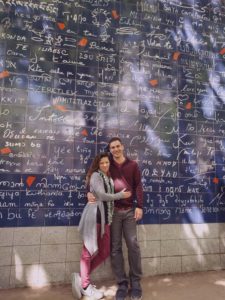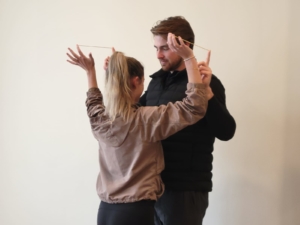Love Made Simple FAQs for therapists
Thank you for taking the time to learn about our workshop – Love Made Simple. We believe this workshop can be a valuable resource for therapists in their work with individuals or couples.
The workshop is helpful for couples who are struggling in their relationship and want to learn how to communicate better and rediscover their love for one another. It’s also a good fit for partners who just want to learn better skills and expand their intimacy.
Within the workshop we have two tracks – one for couples who have been together for a while and one for premarital couples (before or shortly after getting married) who want to create a better foundation for their future.
The workshop is a good fit for couples of all genders and sexual orientations, whether in monogamous or non-monogamous relationships.
We believe the foundation of relationships is connection and communication, which are the aspects the workshop is most focused on. Communication is the biggest challenge couples face, and so in the workshop we teach them to identify their patterns of communication, how to overcome conflict and even how to use it as a way of getting closer to each other. In addition, when couples learn how to create intimacy and connection they feel closer and more satisfied, which then improves their communication.
For premarital couples we add an additional goal of discussing and being aligned around life vision and values.
If you have a client in individual therapy, you may want your client’s partner to learn more about themselves, and for both partners to gain more relationship skills. This workshop can be a great resource for that.
As a couples therapist you have probably wished many times that your couples could just have some fundamental understanding of relationships and basic skills that would make your work easier! This workshop is instrumental in helping couples reduce defensiveness and be open to deeper work. By the end of it both partners understand that they contribute to the relationship’s issues. They learn that underneath their struggles they are both looking for connection, safety and support, and that each person is reacting due to underlying vulnerabilities that they usually don’t recognize or communicate. This puts them in a great position to really take in the therapy and do deeper work.
Our work is based on attachment theory and integrates the key insights and tools of EFT (Emotionally Focused Therapy). We also integrate experiential and somatic methods based on the Hakomi method and PACT (Psychobiological Approach to Couples Therapy).
The work is very experiential and hands-on. In every section we give a short talk and then couples practice with each other. We use a few different types of exercises to ensure the workshop speaks to people with different learning styles – somatic exercises, journaling, and structured questions. Couples discuss each exercise with each other and have the option of an assistant therapist to support them.
The workshop is private. Couples only work with their partner and are not required to share anything in the big group (but they are welcome to ask questions).
Below is a summary of the key learnings in the workshop:
1. Understanding attachment & connection
Through the lens of attachment couples understand the most basic needs and desires that they bring to their relationship. We emphasize learning about attachment in an experiential rather than just intellectual way. We use a mindfulness-based exercise and journaling exercise in which couples learn about their personal instincts and needs in terms of approaching connection in their relationship or taking space and withdrawing. They reflect on how each person tends to reach out for connection, how they respond when their partner is not available, etc.
We also teach couples key tools like love languages, attachment styles and understanding their body language to help them connect in more effective ways. They leave the workshop knowing that their connection is more important than being right or fighting with each other.
2. Emotional regulation & play
Couples will learn to recognize when they get triggered emotionally, and how to use their breath and body to calm themselves down. We also teach a specific exercise in dyadic soothing that helps them relax with each other.
We emphasize throughout the workshop ways to be playful with each other and how to lower distress and activation. We also end the workshop with a playful sensual exercise that is the highlight of the workshop for most couples.
3. Understanding emotions, needs and reactions
Many partners don’t know how to recognize their emotions or how to respond to each other emotionally. We give couples a framework for understanding the role of emotions in our lives and how differences in understanding emotions can cause challenges in the relationship. We tie emotions to underlying core beliefs to help people take responsibility for their own emotional triggers.
4. The negative cycle and communication skills
We teach couples to see their conflict as a result of an underlying negative cycle. Through the exercises each couple identifies their own negative cycle and discovers their specific vulnerabilities and needs. We help them analyze and understand certain situations in which they were in conflict and they learn how to communicate in a way that will create connection rather than defensiveness.
5. Aligning around vision & values
In addition to the above topics, couples in the premarital track (see more below about the logistical details) talk about their vision in key life areas. They get worksheets that help them discuss their values and expectations around topics like money, having kids, roles, spirituality etc. They get to choose which of the topics is most important to them so they can focus on them first.
The workshop lasts two days, Saturday – Sunday from 10am to 6pm and is held at The Lodge at Tiburon. There is an option to stay overnight at the lodge for those traveling.
The workshop has two tracks – for long term couples (couples who have been together for a while, married or not) and for premarital (couples who are engaged or recently married). Both tracks are together for the first day and a half of the workshop, learning about connection and communication. In the last half day the two groups are separated–the premarital group focuses on talking about vision and values, while the long term group continues to focus on communication.
Clients get a 30 page workbook that includes the material presented during the workshop, workshop exercises, plus some bonus exercises they can continue to do on their own.
 The workshop is led by Gal Szekely and Liron Cohen, a married couple and co-founders of The Couples Center. Gal & Liron openly share stories about their own challenges and learnings as a couple. In every workshop additional psychotherapists are available to sit with couples during the exercises and guide them. Couples have mentioned that this individualized attention is one of the most valuable aspects of their workshop experience.
The workshop is led by Gal Szekely and Liron Cohen, a married couple and co-founders of The Couples Center. Gal & Liron openly share stories about their own challenges and learnings as a couple. In every workshop additional psychotherapists are available to sit with couples during the exercises and guide them. Couples have mentioned that this individualized attention is one of the most valuable aspects of their workshop experience.
Gal, the director of The Couples Center, has trained with a variety of couples therapy methods and created his own unique integration. He is a teacher in the Hakomi body-mind therapy method, he teaches couples therapy at CIIS and JFK universities and supervise other therapists.
Liron has a gift for teaching couples how to overcome barriers to connection and create a deeper, more exciting love between them. With a background in design, as a doula and priestess, and a gifted chef, she brings creativity and beauty to everything she does!
You can read more about Gal and Liron here.
Here are questions you can ask couples after the workshop:
• What did you learn about how to make each other feel closer and more connected?
• What do you now understand about your negative communication cycle? What causes it?
• What did you discover about your underlying feelings and needs?
• How can you recognize when you are getting triggered and what can you do about it?
You are also welcome to contact us at info@thecouplescenter.org and we’ll send you a few of the most important worksheets on communication.
